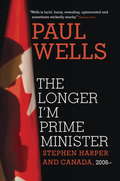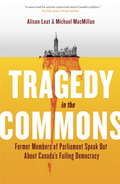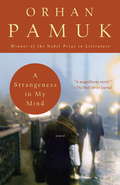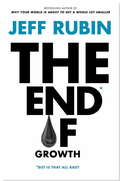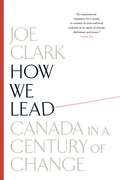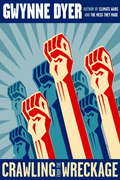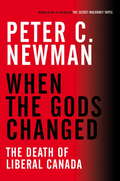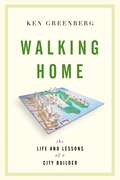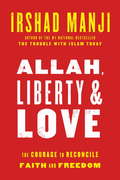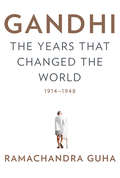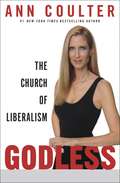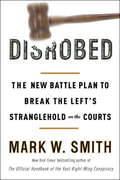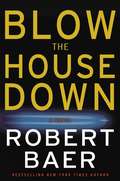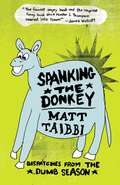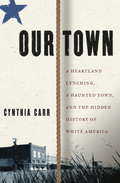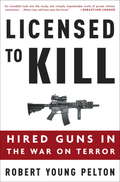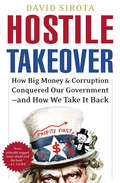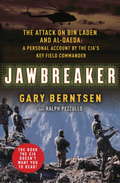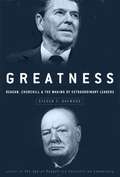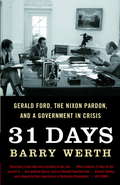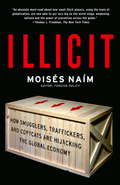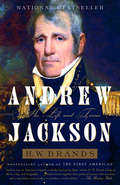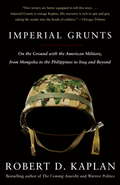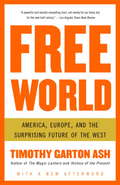- Table View
- List View
The Longer I'm Prime Minister
by Paul WellsThe definitive portrait of Stephen Harper in power by this country's most trenchant, influential and surprising political commentator. Oh, he won, but he won't last. Oh, he may win again but he won't get a majority. Oh, his trick bag is emptying fast, the ads are backfiring, the people are onto him, and soon his own party will turn on him. And let me tell you, it couldn't happen to a nicer guy . . .Despite a constant barrage of outrage and disbelief from his detractors, Stephen Harper is on his way to becoming one of Canada's most significant prime ministers. He has already been in power longer than Lester B. Pearson and John Diefenbaker. By 2015, and the end of this majority term, he'll have caught up to Brian Mulroney. No matter the ups and downs, the triumphs and the self-inflicted wounds, Harper has been moving to build the Canada he wants--the Canada a significant proportion of Canadian voters want or they wouldn't have elected him three times. As Wells writes, "He could not win elections without widespread support in the land. . . . Which suggests that Harper has what every successful federal leader has needed to survive over a long stretch of time: a superior understanding of Canada."In The Longer I'm Prime Minister, Paul Wells explores just what Harper's understanding of Canada is, and who he speaks for in the national conversation. He explains Harper not only to Harper supporters but also to readers who can't believe he is still Canada's prime minister. In this authoritative, engaging and sometimes deeply critical account of the man, Paul Wells also brings us an illuminating portrait of Canadian democracy: "glorious, a little dented, and free."
Tragedy in the Commons
by Michael Macmillan Alison LoatIn Tragedy in the Commons, Alison Loat and Michael MacMillan, founders of the non-partisan think tank Samara, draw on an astonishing eighty exit interviews with former Members of Parliament from across the political spectrum to unearth surprising observations about the practice of politics in Canada. Though Canada is at the top of international rankings of democracies, Canadians themselves increasingly don't see politics as a way to solve society's problems. Small wonder. In the news, they see grandstanding in the House of Commons and MPs pursuing agendas that don't always make sense to the people who elected them. But elected officials make critical choices about how this wildly diverse country functions today and how it will thrive in the future. They direct billions of dollars in public funding and craft the laws that have allowed Canada to lead the way internationally. Even with so much at stake, citizens--voters--are turning away. How did one of the world's most functional democracies go so very wrong? In Tragedy in the Commons, MPs describe arriving at their political careers almost by accident; few say they aspired to be in politics before it "happened" to them. In addition, almost without fail, each MP describes the tremendous influence of their political party: from the manipulation of the nomination process to enforced voting in the House and in committees, the unseen hand of the party dominates every aspect of the MP's existence. Loat and MacMillan ask: Just what do we want Members of Parliament to be doing? To whom are they accountable? And should parties be trusted with the enormous power they wield with such little oversight or citizen involvement? With unprecedented access to the perspective and experience of Canada's public leaders, Tragedy in the Commons concludes by offering solutions for improving the way politics works in Canada, and how all Canadians can reinvigorate a democracy that has lost its way, its purpose and the support of the public it is meant to serve.
A Strangeness in My Mind
by Orhan PamukFrom one of our greatest, a panoramic new novel, his first since Museum of Innocence, bringing us into Istanbul's underground through the eyes of a struggling street vendor. Mevlut, an Istanbul street vendor, has spent his whole life selling a local alcoholic drink. It is the 1990s, and although there were once thousands of boza vendors walking the frozen streets of the city, Mevlut now cuts a lonely figure on snowy winter nights. Falling deeply into debt, and desperate to marry off his incompetent son and satisfy his mistress, Mevlut turns to his old friend Ferhat, who collects payments on electric bills. The partners traverse the back streets of middle class neighbourhoods and shantytowns, venture into flats, shops and restaurants of the poor, relishing their power to punish cheaters and collect bribes. The dangers of Instanbul's underbelly eventually catch up with Mevlut, and he is attacked by a pack of dogs, hospitalized, robbed by bandits and beaten and threatened at every turn. Istanbul is exposed as a city with a rich and dynamic underground culture which seeps into its secular business centres and mainstream society. Mevlut serves as a flighty guide, occasionally attuned to the city's nuances, but with a wild imagination and insticts tainted by desperation.
The End of Growth
by Jeff RubinIn an urgent follow-up to his best-selling Why Your World Is About To Get A Whole Lot Smaller, Jeff Rubin argues that the end of cheap oil means the end of growth. What it will be like to live in a world where growth is over? Economist and resource analyst Jeff Rubin is certain that the world's governments are getting it wrong. Instead of moving us toward economic recovery, measures being taken around the globe right now are digging us into a deeper hole. Both politicians and economists are missing the fact that the real engine of economic growth has always been cheap, abundant fuel and resources. But that era is over. The end of cheap oil, Rubin argues, signals the end of growth--and the end of easy answers to renewing prosperity. Rubin's own equation is clear: with China and India sucking up the lion's share of the world's ever more limited resources, the rest of us will have to make do with less. But is this all bad? Can less actually be more? Rubin points out that there is no research to show that people living in countries with hard-charging economies are happier, and plenty of research to show that some of the most contented people on the planet live in places with no-growth or slow-growth GDPs. But it doesn't matter whether it's bad or good, it's the new reality: our world is not only about to get smaller, our day-to-day lives are about to be a whole lot different.
How We Lead: Canada in a Century of Change
by Joe ClarkA passionate argument for Canada's reassertion of its place on the world stage, from a former prime minister and one of Canada's most respected political figures. In the world that is taking shape, the unique combination of Canada's success at home as a diverse society and its reputation internationally as a sympathetic and respected partner consititute national assets that are at least as valuable as its natural resource wealth. As the world becomes more competitive and complex, and the chances of deadly conflict grow, the example and the initiative of Canada can become more important than they have ever been. That depends on its people: assets have no value if Canadians don't recognize or use them, or worse, if they waste them. A more effective Canada is not only a benefit to itself, but to its friends and neighbours. And in this compelling examination of what it as a nation has been, what it has become and what it can yet be to the world, Joe Clark takes the reader beyond formal foreign policy and looks at the contributions and leadership offered by Canada's most successful individuals and organizations who are already putting these uniquely Canadian assets to work internationally.
Crawling from the Wreckage
by Gwynne DyerGwynne Dyer is cheering up. Sure, the past decade has had more than its share of stupid wars, obsessions about terrorism, denial about climate change, rapacious turbo-capitalism, and lies, lies, lies. But signs of progress actually do abound. While the world is far from perfect as we embark on a fresh decade, Dyer believes that the "sense of sliding out of control towards ten different kinds of disaster has gone." When things go wrong it's always easy to pin blame -- but singling out the forces that lead to positive change can be trickier.In this illuminating collection of columns from the last five years, Gwynne Dyer ferrets out the signs of hope -- without overlooking the issues that remain seemingly intractable. Mining the events of recent history, Dyer contextualizes the recent past and anticipates what the future might have in store. This journalist's beat is global: from Africa to South America, from Europe to the Middle East, and any other region with a political pulse. Acerbic and iconoclastic, Dyer has never been afraid to call 'em like he sees 'em -- and we are all the better for his trademark candour and the breadth of his knowledge and expertise. For anyone seeking to understand the larger forces that shape our society and our world, Crawling from the Wreckage makes for necessary reading.From the Hardcover edition.
When the Gods Changed
by Peter C. NewmanPeter C. Newman, Canada's most "cussed and discussed" political journalist, on the death spiral of the Liberal Party.The May 2, 2011 federal election turned Canadian governance upside down and inside out. In his newest and possibly most controversial book, bestselling author Peter C. Newman argues that the Harper majority will alter Canada so much that we may have to change the country's name. But the most lasting impact of the Tory win will be the demise of the Liberal Party, which ruled Canada for seven of the last ten decades and literally made the country what it is. Newman chronicles, in bloody detail, the de-construction of the Grits' once unassailable fortress and anatomizes the ways in which the arrogance embedded in the Liberal genetic code slowly poisoned the party's progressive impulses. When the Gods Changed is the saga of a political self-immolation unequalled in Canadian history. It took Michael Ignatieff to light the match. (From the Hardcover edition.)
Walking Home: The Life and Lessons of a City Builder
by Ken GreenbergOne of the world's foremost urban designers shares his passion and methods for rejuvenating neglected cities and argues passionately for the importance and possibilities of their renewal.From a youth spent in the boroughs of New York City and other great cities of the world, to his beginnings as an architect in Toronto, Ken Greenberg has long recognized that cities at their best provide much of what we seek in a place to call home. Community, places of culture and business that we can walk to, mass transit and a wealth of amenities that couldn't be supported without a city's density: the mid-century drive to suburbanization deprived us of these inherent advantages of urban living. The realization of this loss, in tandem with pressing recent concerns about energy scarcity and global warming, has made us see cities with fresh eyes and a growing understanding that they can provide us with an unparalleled measure of sustainability.Ken Greenberg has not only advocated for the renewal of downtown cores, he has for thirty years designed the very means by which that renewal can happen. Walking Home is both Ken's story and a lesson in turning the world's urban spaces back into places that can give us not only a platform to face the challenges of the future, but also a place we can call, with pride and satisfaction, home.From the Hardcover edition.
Allah, Liberty & Love
by Irshad Manji"Irshad Manji is the new voice of reform, not only for Islam, but for all religions." -- Deepak Chopra. The New York Times bestselling author to whom Oprah gave her first ever Chutzpah Award, Irshad Manji has written a book that equips all of us to develop moral courage. Among the most visible Muslim reformers of our time, Irshad Manji reflects on the journey she has taken since her previous book catapulted her into the public spotlight, drawing on her real-life encounters with a world full of seekers who are struggling, as she has, to reconcile faith and freedom. Having engaged with politicians, activists, families, students, scholars and ordinary people of various religions and cultures, Manji tells stories that are deeply poignant, frequently funny and always revealing about the morally confused era in which we live. In doing so, she paves a path for Muslims and non-Muslims to defend the values of liberal democracy--and thus discover the Allah of liberty and love. Above all, Manji shows that by participating in this signature cause of the 21st century, individuals can embark on a journey of their own towards moral courage. Allah, Liberty & Love is ultimately a book about how to become a gutsy global citizen working for both personal and world peace. Manji has faith not just in Allah, but also in her fellow human beings. Prepare to be informed as well as inspired.
Gandhi: The Years That Changed The World, 1914-1948
by Ramachandra GuhaAn epic and revelatory biography of one of the most abidingly influential--and controversial--men in modern history.Opening with Gandhi's triumphant return to India in 1915 after decades abroad, and ending with his tragic assassination in 1949, Gandhi: The Years that Changed the World is a remarkable, moving portrait that provides a crucial re-evaluation of India's iconic leader for a new generation. <p><p> Drawing on a wealth of newly uncovered materials unavailable to previous biographers, acclaimed historian and author Ramachandra Guha brings the past to life with extraordinary grace and clarity. Deploying his gifts as a storyteller and scholar, Guha presents Gandhi as both a fascinating human being--a man of fierce hope, eccentric personal beliefs, and sometimes dark and alarming contradictions--as well as a dynamic political force and global icon. <p> Sharp, insightful, balanced, and impeccably researched, this free-standing sequel to Guha's magisterial biography Gandhi Before India is an indispensable resource for a contemporary understanding of Gandhi's ever-evolving legacy.
Godless: The Church of Liberalism
by Ann Coulter"If a martian landed in America and set out to determine the nation's official state religion, he would have to conclude it is liberalism, while Christianity and Judaism are prohibited by law. Many Americans are outraged by liberal hostility to traditional religion. But as Ann Coulter reveals in this, her most explosive book yet, to focus solely on the Left's attacks on our Judeo-Christian tradition is to miss a larger point: liberalismisa religion—a godless one. And it is now entrenched as the state religion of this county. Though liberalism rejects the idea of God and reviles people of faith, it bears all the attributes of a religion. InGodless, Coulter throws open the doors of the Church of Liberalism, showing us its sacraments (abortion), its holy writ (Roe v. Wade), its martyrs (from Soviet spy Alger Hiss to cop-killer Mumia Abu-Jamal), its clergy (public school teachers), its churches (government schools, where prayer is prohibited but condoms are free), its doctrine of infallibility (as manifest in the "absolute moral authority" of spokesmen from Cindy Sheehan to Max Cleland), and its cosmology (in which mankind is an inconsequential accident). Then, of course, there's the liberal creation myth: Charles Darwin's theory of evolution. For liberals, evolution is the touchstone that separates the enlightened from the benighted. But Coulter neatly reverses the pretense that liberals are rationalists guided by the ideals of free inquiry and the scientific method. She exposes the essential truth about Darwinian evolution that liberals refuse to confront:it is bogus science. Writing with a keen appreciation for genuine science, Coulter reveals that the so-called gaps in the theory of evolution are all there is—Darwinism is nothing but a gap. After 150 years of dedicated searching into the fossil record, evolution's proponents have failed utterly to substantiate its claims. And a long line of supposed evidence, from the infamous Piltdown Man to the "evolving" peppered moths of England, has been exposed as hoaxes. Still, liberals treat those who question evolution as religious heretics and prohibit students from hearing about real science when it contradicts Darwinism. And these are the people who say they want to keep faith out of the classroom? Liberals' absolute devotion to Darwinism, Coulter shows, has nothing to do with evolution's scientific validity and everything to do with its refusal to admit the possibility of God as a guiding force. They will brook no challenges to the official religion. Fearlessly confronting the high priests of the Church of Liberalism and ringing with Coulter's razor-sharp wit,Godlessis the most important and riveting book yet from one of today's most lively and impassioned conservative voices. "Liberals love to boast that they are not 'religious,' which is what one would expect to hear from the state-sanctioned religion. Of course liberalism is a religion. It has its own cosmology, its own miracles, its own beliefs in the supernatural, its own churches, its own high priests, its own saints, its own total worldview, and its own explanation of the existence of the universe. In other words, liberalism contains all the attributes of what is generally known as 'religion. '"—From Godless
Disrobed
by Mark W. SmithHow to Bring the Reagan Revolution to America's Courts... Finally. With the Harriet Miers fiasco a distant memory and John Roberts and Samuel Alito sitting on the Supreme Court, conservatives can finally stop worrying about the courts, right? Wrong. Dead wrong. America's courts, legal culture, and law schools remain solidly in the Left's camp. Decades of liberal legal precedents fill volumes of law tomes. Absent a sweeping change-precisely what bestselling author Mark W. Smith calls for in Disrobed- liberals will ruthlessly exploit their dominant position in the law to continue advancing their radical agenda, as they have for the past seventy years. Smith, a nationally recognized attorney, lays out an aggressive new battle plan to thwart the liberal assault on America by turning the courts into allies of the conservative movement. Be warned,Disrobed is not for the fainthearted. Smith implores conservatives: Toss out practically everything you think you know about courts, judges, and American law- because it's naive, anachronistic, and self-defeating. Fearlessly challenging the conventional conservative wisdom, Disrobed reveals: * Why conservatives must immediately embrace- not decry- judicial activism * A bold new model for finding strong conservative judges- behold the "Judicial Reagan" * Why litmus tests, so often vilified, represent the only way to pick reliable conservative judges * How to get sitting judges to "evolve" (finally!) to the right * How the Right can sue more to advance the conservative agenda- on guns, taxes, immigration, the right to life, you name it * How conservatives can turn liberals' favorite court rulings against them * The hard truth that who wins in the courts often depends more on politics and ideology than on the rule of law Smith reminds us that courts, judges, and lawyers need not be enemies of the Right, and can even serve as valuable allies in the war against liberalism. But as his groundbreaking book shows, conservatives must force this change by taking swift action. Disrobed issues a call to arms to all conservatives, revealing that the courts are far too important to be left to the devices of academics, lawyers, and politicians. "Conservatives," Smith writes, "must accept- and adapt our strategies to- the reality of the modern law, even when the truth is uncomfortable. Otherwise the conservative political agenda and the American way of life will keep getting destroyed-legal case by legal case- in the courts."
Blow the House Down: A Novel
by Robert BaerFormer CIA operative Robert Baer pushes fiction to the absolute limit in this riveting and unnervingly plausible alternative history of 9/11.Veteran CIA officer Max Waller has long been obsessed with the abduction and murder of his Agency mentor. Though years of digging yield the name of a suspect--an Iranian math genius turned terrorist--the trail seems too cold to justify further effort. Then Max turns up a photograph of the man standing alongside Osama bin Laden and a mysterious westerner whose face has been cut out, feeding Max's suspicion. When the first official to whom Max shows the photo winds up dead, the out-of-favor agent suddenly finds himself the target of dark forces within the intelligence community who are desperate to muzzle him.Eluding a global surveillance net, Max--in the summer of 2001--begins tracking the spore of a complex conspiracy, meeting clandestinely with suicide bombers and Arab royalty and ultimately realizing the Iranian he'd sought for a decades-old crime is actually at the nexus of a terrifying plot.Showing off dazzling tradecraft and an array of richly textured backdrops, and filled with real names and events, Blow the House Down deftly balances fact and possibility to become the first great thriller to spring from the war on terrorism.Also available as a Random House AudioBook and an eBookFrom the Hardcover edition.
Spanking the Donkey: Dispatches from the Dumb Season
by Matt Taibbi"Spanking the Donkey" indicts the surreal irrelevance of today's mainstream politics with barbed wit and caustic intelligence. Follow Taibbi as he covers the primary for the 2004 presidential election, joining him for a spot on John Kerry's campaign plane, face-to-face encounters with John Edwards's pancake makeup, and more.
Our Town: A Heartland Lynching, a Haunted Town, and the Hidden History of White America
by Cynthia CarrThe brutal lynching of two young black men in Marion, Indiana, on August 7, 1930, cast a shadow over the town that still lingers. It is only one event in the long and complicated history of race relations in Marion, a history much ignored and considered by many to be best forgotten. But the lynching cannot be forgotten. It is too much a part of the fabric of Marion, too much ingrained even now in the minds of those who live there. In Our Town journalist Cynthia Carr explores the issues of race, loyalty, and memory in America through the lens of a specific hate crime that occurred in Marion but could have happened anywhere. Marion is our town, America's town, and its legacy is our legacy. Like everyone in Marion, Carr knew the basic details of the lynching even as a child: three black men were arrested for attempted murder and rape, and two of them were hanged in the courthouse square, a fate the third miraculously escaped. Meeting James Cameron--the man who'd survived--led her to examine how the quiet Midwestern town she loved could harbor such dark secrets. Spurred by the realization that, like her, millions of white Americans are intimately connected to this hidden history, Carr began an investigation into the events of that night, racism in Marion, the presence of the Ku Klux Klan--past and present--in Indiana, and her own grandfather's involvement. She uncovered a pattern of white guilt and indifference, of black anger and fear that are the hallmark of race relations across the country. In a sweeping narrative that takes her from the angry energy of a white supremacist rally to the peaceful fields of Weaver--once an all-black settlement neighboring Marion--in search of the good and the bad in the story of race in America, Carr returns to her roots to seek out the fascinating people and places that have shaped the town. Her intensely compelling account of the Marion lynching and of her own family's secrets offers a fresh examination of the complex legacy of whiteness in America. Part mystery, part history, part true crime saga, Our Town is a riveting read that lays bare a raw and little-chronicled facet of our national memory and provides a starting point toward reconciliation with the past. On August 7, 1930, three black teenagers were dragged from their jail cells in Marion, Indiana, and beaten before a howling mob. Two of them were hanged; by fate the third escaped. A photo taken that night shows the bodies hanging from the tree but focuses on the faces in the crowd--some enraged, some laughing, and some subdued, perhaps already feeling the first pangs of regret. Sixty-three years later, journalist Cynthia Carr began searching the photo for her grandfather's face.
Licensed to Kill: Privatizing the War on Terror
by Robert Young PeltonRobert Young Pelton first became aware of the phenomenon of hired guns in the War on Terror when he met a covert team of contractors on the Afghanistan/Pakistan border in the fall of 2003. Pelton soon embarked on a globe-spanning odyssey to penetrate and understand this shadowy world, ultimately delivering stunning insights into the way private soldiers are used.Enter a blood-soaked world of South African mercenaries and tribal fighters backed by ruthless financiers. Drop into Baghdad’s Green Zone, strap on body armor, and take a daily high-speed ride with a doomed crew of security contractors who dodge car bombs and snipers just to get their charges to the airport. Share a drink in a chic hotel bar with wealthy owners of private armies who debate the best way to stay alive in war zones.Licensed to Kill spans four continents and three years, taking us inside the CIA’s dirty wars; the brutal contractor murders in Fallujah and the Alamo-like sieges in Najaf and Al Kut; the Deep South contractor training camps where ex–Special Operations soldiers and even small town cops learn the ropes; the contractor conventions where macho attendees swap bullet-punctuated tales and discuss upcoming gigs; and the grim Central African prison where contractors turned failed mercenaries pay a steep price.The United States has encouraged the use of the private sector in all facets of the War on Terror, placing contractors outside the bounds of functional legal constraints. With the shocking clarity that can come only from firsthand observation, Licensed to Kill painstakingly deconstructs the most controversial events and introduces the pivotal players. Most disturbingly, it shows that there are indeed thousands of contractors—with hundreds more being produced every month—who’ve been given a license to kill, their services available to the highest bidder.From the Hardcover edition.
Hostile Takeover
by David SirotaDo you ever wonder what corporations get for the millions of dollars they pour into the American political system? Do you ever think the government has been hijacked by forces hostile to average Americans? Do you ever want to fight back? Millions of Americans lack health care and millions more struggle to afford it. Politicians claim they care, then pass legislation that just sends more cash to the HMOs. Wages have been stagnant for thirty years, even as corporate profits skyrocket. Politicians say they want to fix the problem and then pass bills written by lobbyists that drive wages even lower and punish those crushed by debt. Jobs are being shipped overseas, pensions are being cut, and energy is becoming unaffordable. And our government, more concerned about maintaining its corporate sponsorship than protecting its citizens, does nothing about it. In Hostile Takeover, David Sirota, a major new voice in American politics, seeks to open the eyes of ordinary Americans to the fact that corporate interests have undermined democracy, aided and abetted by their lackeys in our allegedly representative government. At a time when more and more of America's major political leaders are being indicted or investigated for corruption, Sirota takes readers on a journey that shows how all of this nefarious behavior happened right under our noses- and how the high-profile scandals are merely one product of a political system and debate wholly owned by Big Money interests. Sirota considers major public issues that feel intractable--like spiraling health care costs, the outsourcing of jobs, the inequities of the tax code, and out-of-control energy prices--and shows how in each case workable solutions are buried under the lies of lobbyists, the influence of campaign cash, and the ubiquitous spin machine financed by Big Business. With fiery passion, pinpoint wit, and lucid analysis, Hostile Takeover reveals the true enemies of reform and their increasingly sophisticated- and hostile- tactics. It's an essential guidebook for those of us tired of the government selling us out- and determined to take our country back.
Jawbreaker: The Attack on Bin Laden and Al Qaeda: A Personal Account by the CIA's Key Field Commander
by Gary Berntsen Ralph PezzulloIn Jawbreaker Gary Berntsen, until recently one of the CIA's most decorated officers, comes out from under cover for the first time to describe his no-holds-barred pursuit of Osama bin Laden and al-Qaeda.With his unique mix of clandestine knowledge and paramilitary training, Berntsen represents the new face of counterterrorism. Recognized within the agency for his aggressiveness, Berntsen, when dispatched to Afghanistan, made annihilating the enemy his job description.As the CIA's key commander coordinating the fight against the Taliban forces around Kabul, and the drive toward Tora Bora, Berntsen not only led dozens of CIA and Special Operations Forces, he also raised 2,000 Afghan fighters to aid in the hunt for bin Laden.In this first-person account of that incredible pursuit, which actually began years earlier in an East Africa bombing investigation, Berntsen describes being ferried by rickety helicopter over the towering peaks of Afghanistan, sitting by General Tommy Franks's side as heated negotiations were conducted with Northern Alliance generals, bargaining relentlessly with treacherous Afghan warlords and Taliban traitors, plotting to save hostages about to be used as pawns, calling in B-52 strikes on dug-in enemy units, and deploying a dizzying array of Special Forces teams in the pursuit of the world's most wanted terrorist. Most crucially, Berntsen tells of cornering bin Laden in the Tora Bora mountains--and what happened when Berntsen begged Washington to block the al-Qaeda leader's last avenue of escape.As disturbingly eye-opening as it is adrenaline-charged, Jawbreaker races from CIA war rooms to diplomatic offices to mountaintop redoubts to paint a vivid portrait of a new kind of warfare, showing what can and should be done to deal a death blow to freedom's enemies.CIA Commander Gary Berntsen on...His eyebrow-raising style:"Most CIA Case Officers advanced their careers by recruiting sources and producing intelligence, I took a more grab-them-by-the-neck approach...I operated on the principle that it was easier to seek forgiveness than ask for approval. Take risks, but make sure you're successful. Success, not good intentions, would determine my fate." Doing whatever it took: "I didn't just want to survive: I wanted to annihilate the enemy. And I didn't want to end up like one of my favorite historical characters--Alexander Burns...He was one of the first of more than 14,000 British soldiers to be wiped out by the Afghans in the First Afghan War. Like Burns before me, I was also an intelligence officer and spoke Persian. This was my second trip into Afghanistan, too. The difference, I told myself, was that Burns had been a gentleman and I would do whatever it took to win." Dealing with a Taliban official who controlled American hostages:"Tell him that if he betrays me or loses the hostages I'll spend every waking moment of my life hunting him down to kill him. Tell him I'm not like any American he has ever met." The capabilities of his Tora Bora spotter team:"Working nonstop, the four men directed strike after strike by B-1s, B-2s, and F-14s onto the al-Qaeda encampment with incredible precision. Somehow through the massive bureaucracy, thousands of miles of distance [and] reams of red tape...the U.S. had managed to place four of the most skilled men in the world above the motherlode of al-Qaeda, with a laser designator and communications system linked to the most potent air power in history...As I listened over our encrypted radio network, one word kept pounding in my head: revenge."Also available as a Random House AudioBookFrom the Hardcover edition.
Greatness: Reagan, Churchill, and the Making of Extraordinary Leaders
by Steven HaywardThe incredible unexplored connections between two of history’s greatest leaders Ronald Reagan and Winston Churchill were true giants of the twentieth century, but somehow historians have failed to notice the many similarities between these extraordinary leaders. Until now. In Greatness, Steven F. Hayward—who has written acclaimed studies of both Reagan and Churchill—goes beneath the superficial differences to uncover the remarkable (and remarkably important) parallels between the two statesmen. In exploring these connections, Hayward shines a light on the nature of political genius and the timeless aspects of statesmanship—critical lessons in this or any age. A swift-moving and original book, Greatness reveals: • The striking similarities between Reagan’s and Churchill’s political philosophies: the two were of the same mind on national defense, the economy, and many other critical issues • What made both Reagan and Churchill so effective in the public arena—including their shared gift for clearly communicating their messages to the people • The connecting thread of the Cold War, which was bookended by Churchill’s “Iron Curtain” address of 1946 and Reagan’s “Tear Down This Wall” speech of 1987 • The odd coincidences that mark everything from their childhoods to their shifts from Left to Right to their shared sense of personal and national destiny Ultimately, Hayward shows, the examples of Churchill and Reagan teach us what is most decisive about political leadership at the highest level—namely, character, insight, imagination, and will. Greatness also serves as a sharp rebuke to contemporary historians who dismiss notions of greatness and the power of individuals to shape history. Hayward demonstrates that the British historian Geoffrey Elton had it right when he wrote, “When I meet a historian who cannot think that there have been great men, great men moreover in politics, I feel myself in the presence of a bad historian. ” From the Hardcover edition.
All God's Children: The Bosket Family and the American Tradition of Violence
by Fox ButterfieldA timely reissue of Fox Butterfield's masterpiece, All God's Children, a searing examination of the caustic cumulative effect of racism and violence over 5 generations of black Americans. Willie Bosket is a brilliant, violent man who began his criminal career at age five; his slaying of two subway riders at fifteen led to the passage of the first law in the nation allowing teenagers to be tried as adults. Butterfield traces the Bosket family back to their days as South Carolina slaves and documents how Willie is the culmination of generations of neglect, cruelty, discrimination and brutality directed at black Americans. From the terrifying scourge of the Ku Klux Klan during Reconstruction to the brutal streets of 1970s New York, this is an unforgettable examination of the painful roots of violence and racism in America.
31 Days: Gerald Ford, the Nixon Pardon, and a Government in Crisis
by Barry WerthIn 31 Days, acclaimed historian Barry Werth takes readers inside the White House during the tumultuous days of August 1974, following Richard Nixon's resignation and the swearing-in of America's "accidental president," Gerald Ford. The Watergate scandal had torn the country apart. In a dramatic, day-by-day account of the new administration's inner workings, Werth shows how Ford, caught between political expedience, the country's demands for justice, and his own moral compass, struggled valiantly to restore the nation's tarnished faith in its leadership. With deft and refreshing analysis Werth illuminates how this unprecedented political upheaval produced new fissures and battle lines, as well as new opportunities for political advancement for ambitious young men such as Donald Rumsfeld, who had been Nixon's ambassador to NATO, and Dick Cheney, already coolly efficient as Rumsfeld's former deputy. A superbly crafted presidential history with all of the twists and turns of a thriller, 31 Days sheds new light on the key players and political dilemmas that reverberate in today's headlines.
Illicit
by Moises NaimA groundbreaking investigation of how illicit commerce is changing the world by transforming economies, reshaping politics, and capturing governments.In this fascinating and comprehensive examination of the underside of globalization, Moises Naím illuminates the struggle between traffickers and the hamstrung bureaucracies trying to control them. From illegal migrants to drugs to weapons to laundered money to counterfeit goods, the black market produces enormous profits that are reinvested to create new businesses, enable terrorists, and even to take over governments. Naím reveals the inner workings of these amazingly efficient international organizations and shows why it is so hard -- and so necessary to contain them. Riveting and deeply informed, Illicit will change how you see the world around you.From the Trade Paperback edition.even take over governments. From pirated movies to weapons of mass destruction, from human organs to endangered species, drugs or stolen art, Illicit reveals the inner workings of these amazingly efficient international organizations and shows why it is so hard--and so necessary--to contain them.Illicit offers a fresh, ingenious and compelling vision of this untold story of globalization. It provides a powerful new lens with which to assess how today's world really works and where it may be headed. Illicit will surely ignite urgent debate at the highest levels--and change the way you think about the world.From the Hardcover edition.
Andrew Jackson: His Life and Times
by H. W. BrandsThe extraordinary story of Andrew Jackson--the colorful, dynamic, and forceful president who ushered in the Age of Democracy and set a still young America on its path to greatness--told by the bestselling author ofThe First American. The most famous American of his time, Andrew Jackson is a seminal figure in American history. The first "common man" to rise to the presidency, Jackson embodied the spirit and the vision of the emerging American nation; the term "Jacksonian democracy" is embedded in our national lexicon. With the sweep, passion, and attention to detail that madeThe First Americana Pulitzer Prize finalist and a national bestseller, historian H. W. Brands shapes a historical narrative that's as fast-paced and compelling as the best fiction. He follows Andrew Jackson from his days as rebellious youth, risking execution to free the Carolinas of the British during the Revolutionary War, to his years as a young lawyer and congressman from the newly settled frontier state of Tennessee. As general of the Tennessee militia, he put down a massive Indian uprising in the South, securing the safety of American settlers, and his famous rout of the British at the Battle of New Orleans during the War of 1812 made him a national hero. But it is Jackson's contributions as president, however, that won him a place in the pantheon of America's greatest leaders. A man of the people, without formal education or the family lineage of the Founding Fathers, he sought as president to make the country a genuine democracy, governed by and for the people. Jackson, although respectful of states' rights, devoted himself to the preservation of the Union, whose future in that age was still very much in question. When South Carolina, his home state, threatened to secede over the issue of slavery, Jackson promised to march down with 100,000 federal soldiers should it dare. In the bestselling tradition ofFounding BrothersandHis Excellencyby Joseph Ellis and ofJohn Adamsby David McCullough,Andrew Jacksonis the first single-volume, full-length biography of Jackson in decades. This magisterial portrait of one of our greatest leaders promises to reshape our understanding of both the man and his era and is sure to be greeted with enthusiasm and acclaim. From the Hardcover edition.
Imperial Grunts: On the Ground with the American Military, from Mongolia to the Philippines to Iraq and Beyond
by Robert D. KaplanA fascinating, unprecedented first-hand look at the soldiers on the front lines on the Global War on Terror. Plunging deep into midst of some of the hottest conflicts on the globe, Robert D. Kaplan takes us through mud and jungle, desert and dirt to the men and women on the ground who are leading the charge against threats to American security. These soldiers, fighting in thick Colombian jungles or on dusty Afghani plains, are the forefront of the new American foreign policy, a policy being implemented one soldier at a time. As Kaplan brings us inside their thoughts, feelings, and operations, these modern grunts provide insight and understanding into the War on Terror, bringing the war, which sometimes seems so distant, vividly to life.
Free World: America, Europe, and the Surprising Future of the West
by Timothy Garton Ash"We, the free, face a daunting opportunity. Previous generations could only dream of a free world. Now we can begin to make it." In his welcome alternative to the rampant pessimism about Euro-American relations, award-winning historian Timothy Garton Ash shares an inspiring vision for how the United States and Europe can collaborate to promote a free world. At the start of the twenty-first century, the West has plunged into crisis. Europe tries to define itself in opposition to America, and America increasingly regards Europe as troublesome and irrelevant. What is to become of what we used to call "the free world"? Part history, part manifesto, Free World offers both a scintillating assessment of our current geopolitical quandary and a vitally important argument for the future of liberty and the shared values of the West.
